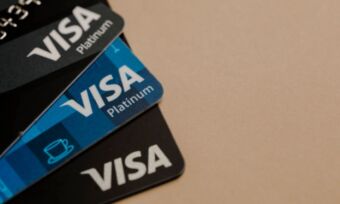How to build credit score with a credit card

If you’re hoping to give your credit score a lift, a credit card can be the right tool for the job – if you know the steps to take.
Whenever you apply for a loan or other type of credit, chances are the lender will check out your credit score. This is a number that’s designed to show lenders, at a glance, how well you’ve managed debt and credit in the past. The higher the score, the better you’ve handled credit, and the more likely you are to be offered a loan, assuming everything else stacks up.
It makes your credit score an important number, and it’s always worth being mindful of ways to improve your score. After all, you never know when you may need to take out a loan.
What is a good credit score?
Personal credit scores are compiled and maintained by a number of credit reference companies such as Equifax, Illion and Experian. They each use slightly different ways to calculate credit scores. But as a guide to what a good credit score looks like, Equifax, which uses a ranking from 0 to 1,200, provides the following breakdown of credit scores:
- Excellent: 853–1,200
- Very Good: 735–852
- Good: 661–734
- Average: 460–660
- Below Average: 0–459
Across Australia, the average Equifax credit score is 846 out of a possible 1,200, which lies in the ‘very good’ range, according to Equifax.
To check your credit score, you can visit the websites of the companies mentioned above, or a quick and easy option is to head to Canstar’s Credit Score checker. Simply taking a look at your score won’t impact it in any way.
But what if you’ve never had a loan or any other type of credit? Without much of a personal track record on debt management, you could have a low score. The 2022 Equifax Australian Credit Scorecard report found the average credit score among Australians aged 18-24 is 665. That’s much lower than the national average of 846, and it’s likely this is because many people in this age range have never taken out a loan.
On the other hand, your credit score could be on the low side if you’ve had a few issues with debt in the past.
Regardless of why your score is low, it can be surprising to learn that it may be possible to improve your credit score with a credit card, as long as you use it wisely.
How your credit card affects your credit score
Before you can work out if it’s possible to use a credit card to improve your credit score, it’s important to understand how having a credit card can impact your score, either positively or negatively. Your credit score is calculated from your credit report, which records your credit history – all of your applications, approvals, rejections, payments, missed payments and credit limits of all of your credit products, such as credit cards, personal loans and home loans. This includes joint accounts or applications.
Some actions, such as paying off a loan or having a good history of paying back credit on time, are positive influences on your credit score. Other actions, such as missing a payment and making too many applications that are rejected, are considered negative influences and could drag your score down. And, if there’s no credit history, or a very limited credit history, it’s difficult for the credit bureau to tell if you are a high or low risk borrower, so that could result in a low score, too.
Learn more: How credit score is calculated
So that’s why, as Equifax explains, a small loan or credit card could help you start to build a credit history, as long as you use it to build a ‘positive’ credit payment history.
How to improve your credit score with a credit card
✅ If you’re a newcomer to credit cards, it’s probably a wise idea to start out gradually by opting for a low credit limit. Sticking to a low limit can positively affect your credit score as lenders can see you aren’t taking on too much debt, according to Equifax.
❌ One step to avoid is making a large number of credit card applications in a short timeframe. This can lower your credit score, and leave lenders wondering if (and why) you’ve been rejected by other card issuers.
✅ A better strategy can be to shop around and compare credit cards, find the card that suits your needs, and keep your applications to a minimum.
✅ And while applying for a credit card could have the potential to slightly lower your credit score – initially at least – the impact of this could potentially be reversed if you pay at least the minimum card payments each month by the due date, according to Equifax. This also means avoiding or minimising card interest charges.
✅ For instance, Equifax says you can start to improve your credit score with a credit card by putting all your monthly purchases on the card, and then pay the card balance out at the end of each month.
❌ It is important to be mindful that along with positive behaviours such as making repayments on time, credit scores also take into account negative behaviours. These can include missing card payments or running late with payments, both of which have the potential to push your credit score down, and potentially undo all your good work improving your credit score.
✅ To help you manage card payments, some banks offer ‘autopay’. This is a function of online banking, which allows you to set up automatic payments of your credit card each month – either the whole balance, the minimum repayment, or an amount you select, so that you never miss a card payment.
✅ It’s also a good idea to keep your card issuer up to date with your address and contact details. Credit card statements will be sent to whatever address is on file with your card issuer, so if you move, be sure to let the card issuer know your new address. This can make it easier to stay on top of card payments, and keep your credit score in good shape.
Can multiple credit cards improve my credit score?
When it comes to improving your credit score with a credit card, it’s not always a case of ‘the more, the merrier. Your credit score can be impacted by the number of credit applications you make, the amount of credit you have, and the number of credit products you hold. This being the case, it can work in your favour to stick to one credit card.
That said, if you already have several credit card accounts which you rarely use or have a good track record of paying off on time, it’s possible that it could work in your favour to hold onto the extra cards instead of closing the surplus accounts. NAB advises against throwing away a rarely used card – especially one with no negative reports, as hanging onto spare cards may have a favourable impact on your credit score. On the flipside, shutting down a credit card can hurt your score. According to Experian, maintaining a long credit history of consistently making debt repayments on time is a plus for your credit score as it reflects your experience in handling credit. But if you have no debts other than your credit card, closing your credit card account may mean you’re no longer able to maintain a track record of regular repayments, and this has the potential to lower your credit score.

0% p.a. interest rate on purchases for 9 mths. Rate reverts to 13.99%. Offer available until 12-JAN-2026. See provider website for full details. Terms and conditions apply.
 24hr approval available
24hr approval available
 Apply in full online
Apply in full online
 Fraud protection
Fraud protection
Canstar may earn a fee for referrals from its website tables, and from Sponsorship or Promotion of certain products. Fees payable by product providers for referrals and Sponsorship or Promotion may vary between providers, website position, and revenue model. Sponsorship or Promotion fees may be higher than referral fees. Sponsored or Promotion products are clearly disclosed as such on website pages. They may appear in a number of areas of the website such as in comparison tables, on hub pages and in articles. Sponsored or Promotion products may be displayed in a fixed position in a table, regardless of the product’s rating, price or other attributes. The table position of a Sponsored or Promoted product does not indicate any ranking or rating by Canstar. For more information please see How We Get Paid.
Check your credit card statements
To recap, it’s possible to improve your credit score with a credit card if you:
- Apply for just one credit card rather than submitting a large number of applications for different credit cards
- Stick to a low credit limit, and
- Make card repayments on time – every time.
There is another step you can take to improve your credit score with a credit card – and that’s checking your card statement each month to be sure all entries are accurate.
Card fraud is a big problem in Australia as more of us hand out our credit card details when we shop online. By checking your card statements each month, it’s easier to pick up a fraudulent entry, which can be reversed out of your account so that you’re not expected to pay for a dodgy transaction. Time limits do apply to these ‘chargebacks’, usually about 45 to 120 days. A quick check of your monthly card statement can help you stay within the timeframe to alert your card issuer of a fraudulent transaction, and make it easier for you to pay for legitimate card purchases on time.
It also makes good financial sense to check your credit score regularly. Unexpected changes in your credit score can be an early warning sign that your identity has been stolen by cyber-crooks, who could open new credit cards in your name, something that can negatively affect your credit score.
Cover image source: Branislav Nenin/Shutterstock.com
Thanks for visiting Canstar, Australia’s biggest financial comparison site*

Try our Credit Cards comparison tool to instantly compare Canstar expert rated options.





